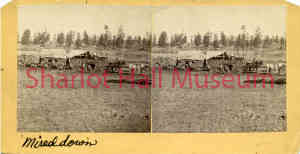By Richard Gorby
The word "post" comes from the Latin "positus", meaning "placed", because horses were put, or placed, at certain distances to transport letters (or travelers). In the time of Julius Caesar the system was already well organized and, for the most part, worked reasonably well.
Some 2000 years later, however, in 1864, at Arizona's new Territorial Capital, Prescott, much the same system was being used, but things were not going well. Since the Post of Fort Whipple was alongside early Prescott, mail was carried by the military which meant soldiers riding between posts who carried some citizen mail as a favor.
A year or so later Prescott had grown to the point that the military considered the civilian mail too much trouble, and other ways had to be found. Carriers on horseback were used, but the cost was high and the risk great. A dry gulch might turn into a roaring torrent at a moment's notice, with the rider, mailbags held high, forcing his horse to cross and sometimes losing the entire shipment.
Buckboards loaded with supplies for the new Prescott merchants were used, but faced the same problems. And Indians were always a worry. From the Arizona Miner: "Mr. Thomas Mulligan, mail carrier between Prescott and Tucson, was attacked and murdered by Indians...". And, again, "In going to the Cienega [in the northern part of Chino Valley], we passed the place where redskins had recently captured a mail, and murdered those who accompanied it. Torn letters and papers were thickly strewn around."
Prescott had its postmaster before it had a post office. When the new Governor John Goodwin and staff moved into the new Territory of Arizona, they brought with them the Reverend Hiram Walker Read, who was to be the new postmaster.
Governor Goodwin was allowed to choose the Territorial Capital, and the obvious choice was Tucson, the largest and almost only town in the new Territory. Reverend Read was made postmaster. Tucson was rejected almost immediately however, by Republican Goodwin and staff because of its Confederate leanings, and the Reverend Read moved with the group to form the new Territorial Capital at the new town of Prescott.
Partly to assuage his disappointment, perhaps, in August of 1864, Reverend Read was given the job of taking the census in the Prescott area, mostly made up of young miners not particularly relished by the minister. Read apparently did the job adequately but not enjoyably.
He conducted Prescott's first religious services at Fort Misery, near the present Prescott Middle School. (Fort Misery, the first building in Prescott, has since been moved to the grounds of Sharlot Hall Museum.) Hardly anyone came. He organized the first Sunday School on August 7, 1864, with all the children attending, though the Arizona Miner said there were but few. Reverend Read also held services on Prescott's Plaza, near the location of today's gazebo, across the street from today's "Whiskey Row", and complained bitterly about the lack of attendance, although across Montezuma at Frank Gross's Place, and Cal Jackson's Saloon, attendance was great.
In about a year, however, the Reverend Read finally had his post office. In 1865 a wood frame building was built on Montezuma Street, just a few feet north of Goodwin next to today's Galloping Goose.
After twelve months in his new post office (with a total postal return of $23.16), the Reverend Read left in disgust, and became G.M. Holaday's Pine Tree Saloon, in 1866. "We have opened a new saloon on Montezuma Street, in the old post office building, where we will keep always on hand the choicest of liquors, wines, and lager beer, and finest cigars that can be had in the market."
There was a government rule that a post office should not be in the same room with a saloon. The Prescott Office was moved across the Plaza to Cortez Street, and the Reverend Postmaster Hiram Walker Read moved out of Arizona.
Richard Gorby is an author/volunteer at the Sharlot Hall Museum Archives and Library.
 Sharlot Hall Museum Photograph Call Number: (ft111p). Reuse only by permission.
Sharlot Hall Museum Photograph Call Number: (ft111p). Reuse only by permission.
Problems with early postal service in the Prescott area ranged from a disgruntled postmaster to wagons and horses getting stuck in the muck.


